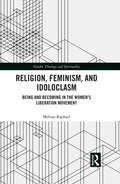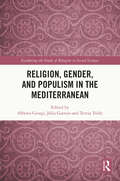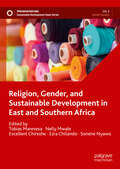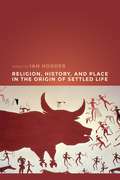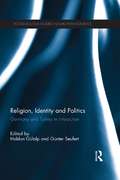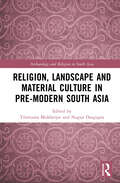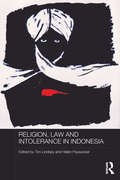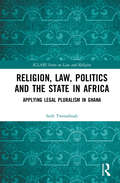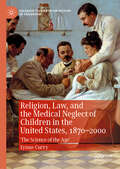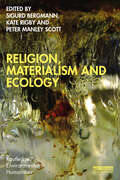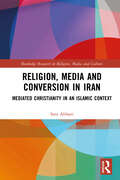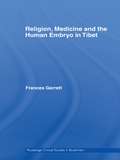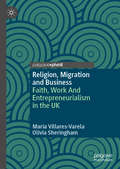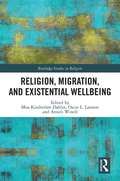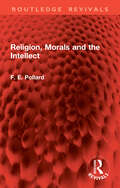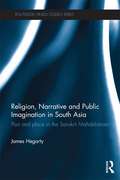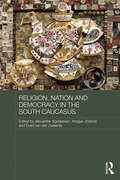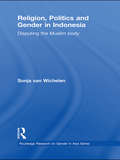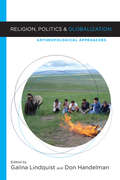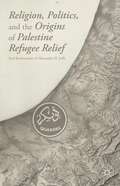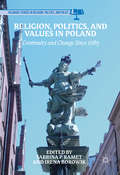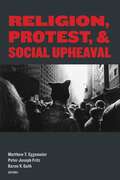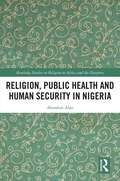- Table View
- List View
Religion, Feminism, and Idoloclasm: Being and Becoming in the Women's Liberation Movement (Gender, Theology and Spirituality)
by Melissa RaphaelReligion, Feminism, and Idoloclasm identifies religious and secular feminism’s common critical moment as that of idol-breaking. It reads the women’s liberation movement as founded upon a philosophically and emotionally risky attempt to liberate women’s consciousness from a three-fold cognitive captivity to the self-idolizing god called ‘Man’; the ‘God’ who is a projection of his power, and the idol of the feminine called ‘Woman’ that the god-called-God created for ‘Man’. Examining a period of feminist theory, theology, and culture from about 1965 to 2010, this book shows that secular, as well as Christian, Jewish, and post-Christian feminists drew on ancient and modern tropes of redemption from slavery to idols or false ideas as a means of overcoming the alienation of women’s being from their own becoming. With an understanding of feminist theology as a pivotal contribution to the feminist criticism of culture, this original book also examines idoloclasm in feminist visual art, literature, direct action, and theory, not least that of the sexual politics of romantic love, the diet and beauty industry, sex robots, and other phenomena whose idolization of women reduces them to figures of the feminine same, experienced as a de-realization or death of the self. This book demonstrates that secular and religious feminist critical engagements with the modern trauma of dehumanization were far more closely related than is often supposed. As such, it will be vital reading for scholars in theology, religious studies, gender studies, visual studies, and philosophy.
Religion, Gender, and Populism in the Mediterranean (Gendering the Study of Religion in the Social Sciences)
by Alberta Giorgi Júlia Garraio Teresa ToldyThis book offers a systematic and comparative analysis of the intersections of religion and gender in times of populism across the EU-Mediterranean. The chapters explore tensions and issues related to religion and gender in nations including Portugal, Italy, Croatia, Bosnia-Herzegovina, Serbia, Greece, Turkey, and Israel/Palestine. Shifting attention from the European Union to the Mediterranean area allows the inclusion of countries whose history is significantly interwoven, taking into account the legacies of colonialism, the effects of post-colonialism, and the role of the EU in relation to gender-related issues in particular. The volume investigates not only country-specific cases but highlights similarities and differences in the region and aims to understand how the interconnections influence the issues at stake. It draws together countries with non-Christian majoritarian religions, with different political regimes, and where feminism and women’s movements have different shapes, histories, and relationships with religion. The book will appeal to scholars interested in the entanglements of gender, religion and populism from a range of disciplines including anthropology, sociology, political science, religious studies and gender studies.
Religion, Gender, and Sustainable Development in East and Southern Africa (Sustainable Development Goals Series)
by Ezra Chitando Tobias Marevesa Nelly Mwale Excellent Chireshe Sonene NyawoThis volume brings to the fore the intersections of religion, gender and sustainable development in 21st century Africa from an interdisciplinary perspective. The volume explores and presents a coherent, research supported argument for the role of religion in promoting gender justice and sustainable development. Contributing authors explicate how the nexus between religion and gender can be utilized as the backdrop for achieving sustainable development in Africa, focusing on Sustainable Development Goal (SDG) 5, “Achieve gender equality and empower all women and girls.” Chapters in this volume focus on a variety of topics, including, how African Traditional Religions, Christianity (mainline, AICs, Pentecostalism), Islam, Rastafari, etc., are being used to promote SDG 5 in African countries.
Religion, History, and Place in the Origin of Settled Life
by Ian HodderThis volume explores the role of religion and ritual in the origin of settled life in the Middle East, focusing on the repetitive construction of houses or cult buildings in the same place. Prominent archaeologists, anthropologists, and scholars of religion working at several of the region’s most important sites—such as Çatalhöyük, Göbekli Tepe, Körtik Tepe, and Aşıklı Höyük—contend that religious factors significantly affected the timing and stability of settled economic structures. Contributors argue that the long-term social relationships characteristic of delayed-return agricultural systems must be based on historical ties to place and to ancestors. They define different forms of history-making, including nondiscursive routinized practices as well as commemorative memorialization. They consider the timing in the Neolithic of an emerging concern with history-making in place in relation to the adoption of farming and settled life in regional sequences. They explore whether such correlations indicate the causal processes in which history-making, ritual practices, agricultural intensification, population increase, and social competition all played a role. Religion, History, and Place in the Origin of Settled Life takes a major step forward in understanding the adoption of farming and a settled way of life in the Middle East by foregrounding the roles of history-making and religious ritual. This work is relevant to students and scholars of Near Eastern archaeology, as well as those interested in the origins of agriculture and social complexity or the social role of religion in the past. Contributors: Kurt W. Alt, Mark R. Anspach, Marion Benz, Lee Clare, Anna Belfer-Cohen, Morris Cohen, Oliver Dietrich, Güneş Duru, Yilmaz S. Erdal, Nigel Goring-Morris, Ian Hodder, Rosemary A. Joyce, Nicola Lercari, Wendy Matthews, Jens Notroff, Vecihi Özkaya, Feridun S. Şahin, F. Leron Shults, Devrim Sönmez, Christina Tsoraki, Wesley Wildman
Religion, Identity and Politics: Germany and Turkey in Interaction (Studies in European Sociology)
by Haldun Gülalp Günter SeufertGerman–Turkish relations, which have a long history and generally unrecognized depth, have rarely been examined as mutually formative processes. Isolated instances of influence have been examined in detail, but the historical and still ongoing processes of mutual interaction have rarely been seriously considered. The ruling assumption has been that Germany may have an impact on Turkey, but not the other way around. Religion, Identity and Politics examines this mutual interaction, specifically with regard to religious identities and institutions. It opposes the commonly held assumption that Europe is the abode of secularism and enlightenment, while the lands of Islam are the realm of backwardness and fundamentalism. Both historically and contemporarily, Germany has treated religion as a core aspect of communal and civilizational identity and framed its institutions accordingly; the book explores how there has been, and continues to be, a mutual exchange in this regard between Germany and both the Ottoman Empire and modern Turkey. The authors show that the definition of identity and regulation of communities have been explicitly based on religion until the early and since the late twentieth century; the period in between– the age of secular nationalism– which has always been treated as the norm, now appears more clearly as an exception. This book will be of interest to students and scholars of sociology, politics, history and religion.
Religion, Landscape and Material Culture in Pre-modern South Asia (Archaeology and Religion in South Asia)
by Tilottama Mukherjee and Nupur DasguptaThis book highlights emerging trends and new themes in South Asian history. It covers issues broadly related to religion, materiality and nature from differing perspectives and methods to offer a kaleidoscopic view of Indian history until the late eighteenth century. The essays in the volume focus on understanding questions of premodern religion, material culture processes and their spatial and environmental contexts through a study of networks of commodities and cultural and religious landscapes. From the early history of coastal regions such as Gujarat and Bengal to material networks of political culture, from temples and their connection with maritime trade to the importance of landscape in influencing temple-building, from regions considered peripheral to mainstream historiography to the development of religious sects, this collection of articles maps the diverse networks and connections across regions and time. The volume will be of great interest to scholars and researchers of history, archaeology, museum and heritage studies, religion, especially Hinduism, Sufism and Buddhism, and South Asian studies.
Religion, Law and Intolerance in Indonesia (Routledge Law in Asia)
by Tim Lindsey Helen PausackerDespite its overwhelmingly Muslim majority, Indonesia has always been seen as exceptional for its diversity and pluralism. In recent years, however, there has been a rise in "majoritarianism", with resurgent Islamist groups pushing hard to impose conservative values on public life – in many cases with considerable success. This has sparked growing fears for the future of basic human rights, and, in particular, the rights of women and sexual and ethnic minority groups. There have, in fact, been more prosecutions of unorthodox religious groups since the fall of Soeharto in 1998 than there were under the three decades of his authoritarian rule. Some Indonesians even feel that the pluralism they thought was constitutionally guaranteed by the national ideology, the Pancasila, is now under threat. This book contains essays exploring these issues by prominent scholars, lawyers and activists from within Indonesia and beyond, offering detailed accounts of the political and legal implications of rising resurgent Islamism in Indonesia. Examining particular cases of intolerance and violence against minorities, it also provides an account of the responses offered by a weak state that now seems too often unwilling to intervene to protect vulnerable minorities against rising religious intolerance.
Religion, Law, Politics and the State in Africa: Applying Legal Pluralism in Ghana (ICLARS Series on Law and Religion)
by Seth TweneboahApplying a legal pluralist framework, this study examines the complex interrelationships between religion, law and politics in contemporary Ghana, a professedly secular State characterised by high levels of religiosity. It aims to explore legal, cultural and moral tensions created by overlapping loci of authority (state actors, traditional leaders and religious functionaries). It contends that religion can function as an impediment to Ghana’s secularity and also serve as an integral tool for realising the State’s legal ideals and meeting international human rights standards. Using three case studies – legal tensions, child witchcraft accusations and same-sex partnerships – the study illustrates the ways that the entangled and complicated connections between religion and law compound Ghana’s secular orientation. It suggests that legal pluralism is not a mere analytical framework for describing tensions, but ought to be seen as part of the solution. The study contributes to advancing knowledge in the area of the interrelationships between religion and law in contemporary African public domain. This book will be a valuable resource for those working in the areas of Law and Religion, Religious Studies, African Studies, Political Science, Legal Anthropology and Socio-legal Studies.
Religion, Law, and the Medical Neglect of Children in the United States, 1870–2000: 'The Science of the Age' (Palgrave Studies in the History of Childhood)
by Lynne CurryDrawing upon a diverse range of archival evidence, medical treatises, religious texts, public discourses, and legal documents, this book examines the rich historical context in which controversies surrounding the medical neglect of children erupted onto the American scene. It argues that several nineteenth-century developments collided to produce the first criminal prosecutions of parents who rejected medical attendance as a tenet of their religious faith. A view of children as distinct biological beings with particularized needs for physical care had engendered both the new medical practice field of pediatrics and a vigorous child welfare movement that forced legislatures and courts to reconsider public and private responsibility for ensuring children’s physical well-being. At the same time, a number of healing religions had emerged to challenge the growing authority of medical doctors and the appropriate role of the state in the realm of child welfare. The rapid proliferation of the new healing churches, and the mixed outcomes of parents’ criminal trials, reflected ongoing uneasiness about the increasing presence of science in American life.
Religion, Materialism and Ecology (Routledge Environmental Humanities)
by Sigurd Bergmann, Kate Rigby and Peter Manley ScottThis timely collection of essays by leading international scholars across religious studies and the environmental humanities advances a lively discussion on materialism in its many forms. While there is little agreement on what ‘materialism’ means, it is evident that there is a resurgence in thinking about matter in more animated and active ways. The volume explores how debates concerning the new materialisms impinge on religious traditions and the extent to which religions, with their material culture and beliefs in the Divine within the material, can make a creative contribution to debates about ecological materialisms. Spanning a broad range of themes, including politics, architecture, hermeneutics, literature and religion, the book brings together a series of discussions on materialism in the context of diverse methodologies and approaches. The volume investigates a range of issues including space and place, hierarchy and relationality, the relationship between nature and society, human and other agencies, and worldviews and cultural values. Drawing on literary and critical theory, and queer, philosophical, theological and social theoretical approaches, this ground-breaking book will make an important contribution to the environmental humanities. It will be a key read for postgraduate students, researchers and scholars in religious studies, cultural anthropology, literary studies, philosophy and environmental studies.
Religion, Media and Conversion in Iran: Mediated Christianity in an Islamic Context (Routledge Research in Religion, Media and Culture)
by Sara AfshariReligion, Media and Conversion in Iran studies the reception of Farsi Christian television channels by Muslim audiences in Iran: their motivations in viewing the Christian message, their methods of interpretation and negotiation with different media texts and their process of changing or altering their religion. Rooted in empirical research, it analyses three hundred narratives drawn from the audiences of four Farsi Christian satellite television channels between 2010 and 2015, investigating their conversion to Christianity through that medium. The research examines factors that influenced both their interpretations of, and negotiations with, the religious media message, and their process of changing, adding to or modifying their belief system, including their understanding of religious conversion. Drawing on Reception Theory, the book investigates the negotiations between meaning making and mediation and the process of faith transformation against the background of the sociology of religion and culture in contemporary Iran. By offering a unique insight into the way in which media and religion influence each other, this book is a great resource for any scholar of Religious Studies, Media Studies and Middle East Studies and will also be useful for religious media practitioners.
Religion, Medicine and the Human Embryo in Tibet (Routledge Critical Studies in Buddhism)
by Frances GarrettThis book explores the cultural history of embryology in Tibet, in culture, religion, art and literature, and what this reveals about its medicine and religion. Filling a significant gap in the literature this is the first in-depth exploration of Tibetan medical history in the English language. It reveals the prevalence of descriptions of the development of the human body – from conception to birth – found in all forms of Tibetan religious literature, as well as in medical texts and in art. By analysing stories of embryology, Frances Garrett explores questions of cultural transmission and adaptation: How did Tibetan writers adapt ideas inherited from India and China for their own purposes? What original views did they develop on the body, on gender, on creation, and on life itself? The transformations of embryological narratives over several centuries illuminate key turning points in Tibetan medical history, and its relationship with religious doctrine and practice. Embryology was a site for both religious and medical theorists to contemplate profound questions of being and becoming, where topics such as pharmacology and nosology were left to shape secular medicine. The author argues that, in terms of religion, stories of human development comment on embodiment, gender, socio-political hierarchy, religious ontology, and spiritual progress. Through the lens of embryology, this book examines how these concerns shift as Tibetan history moves through the formative 'renaissance' period of the twelfth through to the seventeenth centuries.
Religion, Migration and Business: Faith, Work And Entrepreneurialism in the UK (Religion and Global Migrations)
by Olivia Sheringham María Villares-VarelaThis book critically interrogates the role of religious faith in the experiences and practices of migrant entrepreneurs against the backdrop of neoliberal Britain. Focussing on Pentecostalism, a popular Christian denomination amongst migrant groups in the UK, the authors draw on primary qualitative data to examine the ways in which Pentecostal beliefs and values influence the aspirations and practices of migrant entrepreneurs. The book also explores the role of Pentecostal churches in supporting entrepreneurial activities among migrant communities, arguing that these institutions simultaneously comply and contest the formation of neoliberal subjectivities: providing cultural legitimacy to the entrepreneurial subject, whilst also contesting the community erosion of neoliberalism, (particularly in an austerity context) and fostering a strong a sense of belonging among congregants. The book offers an interdisciplinary perspective spanning sociology, geography and entrepreneurship studies to explain how values and faith networks shape everyday life, work and entrepreneurial practices.
Religion, Migration, and Existential Wellbeing: Theorizing the Role of Religion in Contemporary Migration and Integration Governance (Routledge Studies in Religion)
by Moa Kindström DahlinThis book uses the very latest research to examine current interactions between religion, migration and existential wellbeing. In particular, it demonstrates the role of religion and religious organizations in the social, medical and existential wellbeing of immigrants within their host societies. By focusing on the role and politics of religion and religious organisations as well as the religious identity and faith of individuals, it highlights the connection between existential wellbeing, integration and social cohesion. The book brings together researchers from various disciplines taking on the challenge to elaborate on the theme of this book from different perspectives, using different methods and theories with a wide selection of cases from various parts of the world. The value of multidisciplinary research on the role of religion in a globalised society – locally, nationally and internationally – is important for understanding the composition and potential solutions to social and political problems. Religious aspects and organisations are present in legal, political and social forms of governance and form the basis for future research on e.g. secularisation, democracy, minorities, human rights, welfare, healthcare and identity formation. These and other related topics are discussed in this book. This book is an up-to-date and multifaceted study of how religion engages with the mass movement of peoples. As such, it will be of great interest to any scholar of Religious Studies, Migrant Studies, Sociology of Religion, Religion and Politics, as well as Legal Studies with a human right focus.
Religion, Morals and the Intellect (Routledge Revivals)
by F. E. PollardOriginally published in 1932, and therefore inevitably of its time, this book discusses the place of the intellect as a guide to religious truth. The author's work brought principles from Quaker decision-making to bear on wider questions about democracy and religion. The author affirms that the ‘Light Within’, although a personal endowment is not independent of the historical fact that spiritual geniuses in bygone ages have seen and testified and lived.
Religion, Narrative and Public Imagination in South Asia: Past and Place in the Sanskrit Mahabharata (Routledge Hindu Studies Series)
by James HegartyThe Sanskrit Mahabharata is one of the greatest works of world literature and pivotal for the understanding of both Hindu traditions and wider society in ancient, medieval and modern South Asia. This book presents a new synthesis of philological, anthropological and cognitive-linguistic method and theory in relation to the study of narrative text by focusing on the form and function of the Mahabharata in the context of early South Asia. Arguing that the combination of structural and thematic features that have helped to establish the enduring cultural centrality of religious narrative in South Asia was first outlined in the text, the book highlights the Mahabharata’s complex orientation to the cosmic, social and textual past. The book shows the extent to which narrative is integral to human social life, and more generally the creation and maintenance of religious ideologies. It highlights the contexts of origin and transmission and the cultural function of the Mahabharata in first millennium South Asia and, by extension, in medieval and modern South Asiaby drawing on both textual and epigraphic sources. The book draws attention to what is culturally specific about the origination and transmission of early South Asian narrative and what can be used to enrich our orientation to narrative in human social life more globally.
Religion, Nation and Democracy in the South Caucasus (Routledge Contemporary Russia and Eastern Europe Series)
by Ansgar Jödicke Alexander Agadjanian Evert van der ZweerdeThis book explores developments in the three major societies of the South Caucasus – Armenia, Azerbaijan and Georgia – focusing especially on religion, historical traditions, national consciousness, and political culture, and on how these factors interact. It outlines how, despite close geographical interlacement, common historical memories and inherited structures, the three countries have deep differences; and it discusses how development in all three nations has differed significantly from the countries’ declared commitments to democratic orientation and European norms and values. The book also considers how external factors and international relations continue to impact on the three countries.
Religion, National Identity, and Confessional Politics in Lebanon
by Robert G. RabilTracing the rise of Islamism in Lebanon and its attempt to Islamize society and state by the reverse integration of society and state into the project of Islamism, this book looks at Lebanonagainst a background of weak and contestednational identity and capricious interaction between religious affiliation and confessional politics, and attempts to illustrate in detailed analysis this "comprehensive" project of Islamism according to its ideological and practical evolutionary change. The author demonstrates that, despite ideological, political and confessional incongruities and concerns, Islamism, in both its Sunni and Shi'a variants, has maintained a unity of purpose in pursuing its project: "Jihad" against Israel and abolishment of political sectarianism. "
Religion, Politics and Gender in Indonesia: Disputing the Muslim Body (Routledge Research on Gender in Asia Series)
by Sonja van WichelenThe political downfall of the Suharto administration in 1998 marked the end of the "New Order" in Indonesia, a period characterized by 32 years of authoritarian rule. It opened the way for democracy, but also for the proliferation of political Islam, which the New Order had discouraged or banned. Many of the issues raised by Muslim groups concerned matters pertaining to gender and the body. They triggered heated debates about women’s rights, female political participation, sexuality, pornography, veiling, and polygamy. The author argues that public debates on Islam and Gender in contemporary Indonesia only partially concern religion, and more often refer to shifting moral conceptions of the masculine and feminine body in its intersection with new class dynamics, national identity, and global consumerism. By approaching the contentious debates from a cultural sociological perspective, the book links the theoretical domains of body politics, the mediated public sphere, and citizenship. Placing the issue of gender and Islam in the context of Indonesia, the biggest Muslim-majority country in the world, this book is an important contribution to the existing literature on the topic. As such, it will be of great interest to scholars of anthropology, sociology, and gender studies.
Religion, Politics, And Globalization: Anthropological Approaches (Berghahn Ser.)
by Galina Don HandelmanWhile social scientists, beginning with Weber, envisioned a secularized world, religion today is forthrightly becoming a defining feature of life all around the globe. The complex connections between religion and politics, and the ways in which globalization shapes these processes, are central themes explored in this volume by leading scholars in the field of religion. Does the holism of numerous past and present day cosmologies mean that religions with their holistic orientations are integral to human existence? What happens when political ideologies and projects are framed as transcendental truths and justified by Divine authority? How are individual and collective identities shaped by religious rhetoric, and what are the consequences? Can mass murder, deemed terrorism, be understood as a form of ritual sacrifice, and if so, what are the implications for our sensibilities and practices as scholars and citizens? Using empirical material, from historical analyses of established religions to the everyday strife of marginalized groups such as migrants and dissident movements, this volume deepens the understanding of processes that shape the contemporary world.
Religion, Politics, And The Origins Of Palestine Refugee Relief
by Asaf Romirowsky Alexander H. JoffeThis book examines the leading role of the Quaker American Friends Service Committee in the United Nations relief program for Palestine Arab refugees in 1948-1950 in the Gaza Strip. Using archival data, oral histories, and biographical accounts, it provides a detailed look at internal decision-making in an early non-governmental organization.
Religion, Politics, and Values in Poland: Continuity and Change Since 1989 (Palgrave Studies in Religion, Politics, and Policy)
by Sabrina P. Ramet and Irena BorowikThis volume brings together leading scholars to examine how the Church has brought its values into the political sphere and, in the process, alienated some of the younger generation. Since the disintegration of the communist one-party state at the end of the 1980s, the Catholic Church has pushed its agenda to ban abortion, introduce religious instruction in the state schools, and protect Poland from secular influences emanating from the European Union. As one of the consequences, Polish society has become polarized along religious lines, with conservative forces such as Fr. Rydzyk’s Radio Maryja seeking to counter the influence of the European Union and liberals on the left trying to protect secular values. This volume casts a wide net in topics, with chapters on Pope John Paul II, Radio Maryja, religious education, the Church’s campaign against what it calls “genderism,” and the privatization of religious belief, among other topics.
Religion, Protest, and Social Upheaval
by Matthew T. Eggemeier, Peter Joseph Fritz, and Karen V. GuthRepresents some of the best, cutting-edge thinking available on multiple forms of social upheaval and related grassroots movements.From the January 2017 Women’s March to the August 2017 events in Charlottesville and the 2020 protests for racial justice in the wake of George Floyd’s murder, social upheaval and protest have loomed large in the United States in recent years. The varied, sometimes conflicting role of religious believers, communities, and institutions in such events and movements calls for scholarly analysis. Arising from a conference held at the College of the Holy Cross in November 2017, Religion, Protest, and Social Upheaval gathers contributions from ten scholars in religious studies, theology and ethics, and gender studies—from seasoned experts to emerging voices—to illuminate this tumultuous era of history and the complex landscape of social action for economic, racial, political, and sexual and gender justice.The contributors consider the history of resistance to racial capitalist imperialism from W. E. B. Du Bois to today; the theological genealogy of the capitalist economic order, and Catholic theology’s growing concern with climate change; affect theory and the rise of white nationalism, theological aesthetics, and solidarity with migrants; differing U.S. Christian churches’ responses to the “revolutionary aesthetics” of the Black Lives Matter movement; Muslim migration and the postsecular character of Muslim labor organizing in the United States; shifts in moral reasoning and religiosity among U.S. women’s movements from the 1960s to today; and the intersection of heresy discourse and struggles for LGBTQ+ equality among Korean and Korean-American Protestants. With this pluralistic approach, Religion, Protest, and Social Upheaval offers a snapshot of scholarly religious responses to the crises and promises of the late 2010s and early 2020s. Representing the diverse coalitions of the religious left, it provides groundbreaking analysis, charts trajectories for further study and action, and offers visions for a more hopeful future.
Religion, Public Health and Human Security in Nigeria (Routledge Studies on Remote Places and Remoteness)
by Abiodun AlaoThis book critically examines the intersection of religion, public health and human security in Nigeria. Focusing on Christianity, Islam, traditional religions and "intra-religious" doctrinal divergencies, the book explores the impact faith has on health-related decisions and how this affects security in Nigeria. The book assesses the connection between religion and five contemporary major health and medical issues in the country. This includes the issue of epidemics and pandemics such as the Covid-19 pandemic, vaccines, contraception, blood transfusion and the controversies associated with "miracle healing". In particular, the book explores situations where individuals have the power of choice but instead, embraces faith and religious positions that contradict science in the management of their health and, in the process, expose themselves and others to personal health insecurity. It investigates aspects of human security including the wider international ramifications of health issues, approaches to cures and the interpretation of causes of diseases, as well as the ethno-religious connotations of such interpretations. Exploring key issues that have brought religion into the politics of health and human security in Nigeria, this book will be of interest to students and scholars in the field of African Religion, African Politics, African Studies, public health, security, and Sociology.
Religion, Race, and the Making of Confederate Kentucky, 1830-1880
by Luke E. HarlowThis book sheds new light on the role of religion in the nineteenth-century slavery debates. In it, Luke E. Harlow argues that ongoing conflict over the meaning of Christian "orthodoxy" constrained the political and cultural horizons available for defenders and opponents of American slavery. The central locus of these debates was Kentucky, a border slave state with a long-standing antislavery presence. Although white Kentuckians famously cast themselves as moderates in the period and remained with the Union during the Civil War, their religious values showed no moderation on the slavery question. When the war ultimately brought emancipation, white Kentuckians found themselves in lockstep with the rest of the Confederate South. Racist religion thus paved the way for the making of Kentucky's Confederate memory of the war, as well as a deeply entrenched white Democratic Party in the state.
